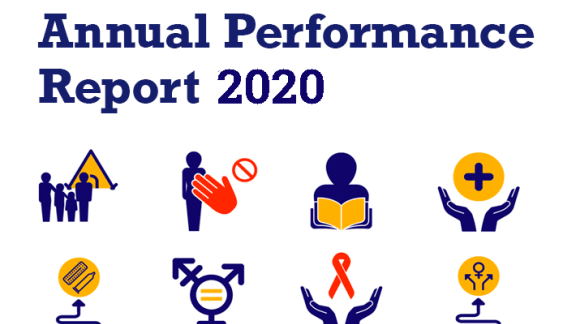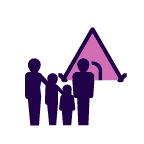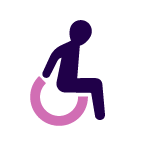Sexual and reproductive health services delivered • People receiving clinical services from IPPF • Couple years of protection • IPPF's service delivery model • Other key results • Policy and legislative changes, by theme •
The Annual Performance Report 2020 summarizes progress made by IPPF to achieve our Strategic Framework 2016-2022 so that everyone can realize their sexual and reproductive health and rights.
Read the full report
Sexual and reproductive health services delivered
IPPF delivers quality, integrated sexual and reproductive health services with a focus on reaching the poor and vulnerable to ensure that no one is denied the services they need due to service provider attitudes, stigma, discrimination or inability to pay.
Read the full report
People receiving clinical services from IPPF
IPPF provides quality integrated sexual and reproductive health services to those who are most in need and who are more likely to be socially-excluded and underserved.
Read the full report
Couple years of protection
Couple years of protection (CYP) refers to the total number of years of contraceptive protection provided to a couple. The majority of IPPF's CYP comes from long-acting and permanent methods, with intrauterine devices being the largest contributor.
couple years of protection (CYP)
Read the full report
IPPF's service delivery model
IPPF provides sexual and reproductive health services in static clinics, and mobile and outreach facilities that are owned and operated by Member Associations as well as through a large network of IPPF community-based distributors. We also enable services in associated health facilities and support other public and private providers to distribute contraceptive methods. Many of our service delivery points operate in remote locations to reach those with greatest unmet need.
Read the full report
Other key results
IPPF’s provision of contraception averted millions of unintended pregnancy and unsafe abortion. IPPF delivered comprehensive sexuality education programmes to young people in both in school and out of school settings, and almost half of all clinical services are delivered to young people.
98.2 million sexual and reproductive health services were provided to young people, or 45 per cent of all IPPF's services. The most common were contraceptive, HIV-related and paediatric services.
Read the full report
Read the full report
Some country-level advocacy wins from 2019
IPPF advocates for the protection and fulfilment of sexual and reproductive rights and gender equality at subnational, national, regional and international levels. We work in partnership with youth and women leaders and civil society organizations to strengthen advocacy efforts. IPPF contributed to 141 policy and legislative changes in support or defence of sexual and reproductive health and rights in 2019.
Chile
Asociación Chilena de Protección de la Familia (APROFA)
In 2017, a new law was adopted permitting abortion in limited circumstances in Chile. However, barriers to providing safe abortion continued to exist. Although WHO recommendations for safe abortion require mifepristone and misoprostol for gyneacological use, these were not registered in Chile. For two years, APROFA advocated to the Ministry of Health, preparing and submitting the necessary technical documentation. Finally, in October 2019, both mifepristone and misoprostol were registered, significantly increasing the sexual and reproductive rights of women by making the provision of safe medical abortion a reality.
Tajikistan
Tajikistan Family Planning Association (TFPA)
TFPA collaborated with government ministries and committees to establish a multi-sectoral and well-coordinated response to gender-based violence with strengthened collaboration between key structures and the development of new policies and standards. TFPA, working in close partnership with the Republican Centre for Family Medicine and UNFPA, created new Standard Operating Procedures specifically for healthcare and social workers. These include clear guidelines on the provision of psychosocial services for survivors of gender-based and domestic violence which had not been available previously.
Sudan
Sudan Family Planning Association (SFPA)
To address the unmet need for contraception, the government of Sudan launched its first National Family Planning Strategy in 2019. The strategy addresses the determinants of family planning utilization and prioritizes access to quality integrated contraceptive services. It addresses the steps for effective implementation of the strategy to increase demand for and uptake of modern contraceptive methods. SFPA worked closely with the Ministry of Health in the taskforce meetings, providing guidance and actively participating in the development and drafting of the strategy.
Cape Verde
Associação Caboverdiana para a Proteção da Familia (VERDEFAM)
VERDEFAM engages civil society to raise awareness of gender equality issues and to advocate for women’s equal economic and political participation as necessary factors to achieve sustainable economic growth. As part of the Cape Verdean Parliamentary Women Network, VERDEFAM has been advocating for a new Parity Law, holding one-on-one meetings with policy-makers and providing technical support in drafting the new law. In 2019, the Parity Law was approved requiring equal female representation in government and full participation in policy-making.
Pakistan
Rahnuma-Family Planning Association of Pakistan (Rahnuma-FPAP)
To improve access to modern contraception and reduce maternal and child mortality rates in the region, the Sindh government passed the Sindh Reproductive Healthcare Rights Act 2019. It promotes access to information, allowing service users to make informed and autonomous decisions about their contraceptive choices, free from coercion or force. Rahnuma-FPAP engaged with policy-makers, parliamentarians, media, civil society and youth to build the necessary support for this legislation and provided technical guidance to the government during the development of the new law.
New Zealand
Family Planning New Zealand (NZFP)
The first national Child and Youth Wellbeing Strategy was approved in 2019. It includes a focus on supporting young people to make healthy choices around relationships and sexual health through access to information and education as well as sexual violence prevention services. NZFP provided written submissions and made presentations to the Committee of the Department of the Prime Minister. Recommendations to make changes to language and to reframe messages on sexuality more positively were developed by NZFP and a focus on empowering young people to make safe choices was highlighted as a critical aspect in the strategy.
Read the full report
when















